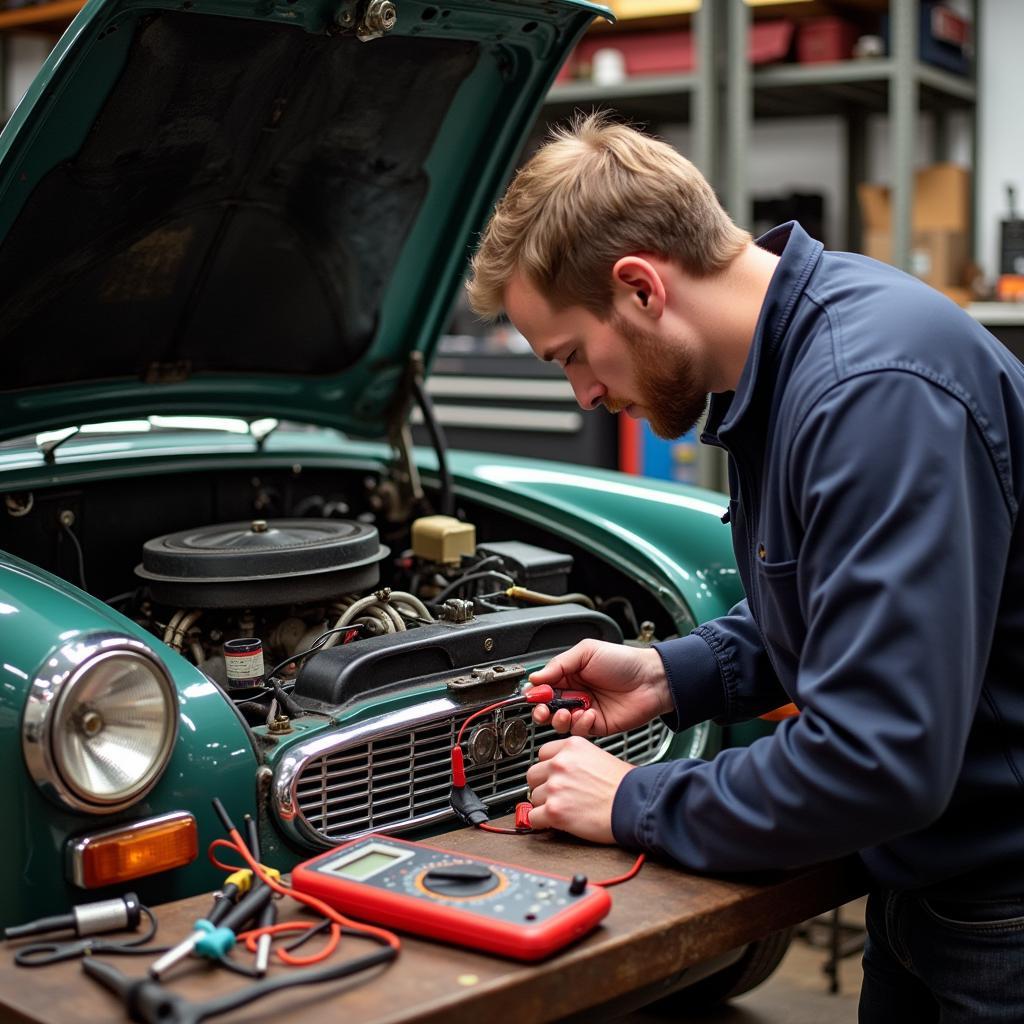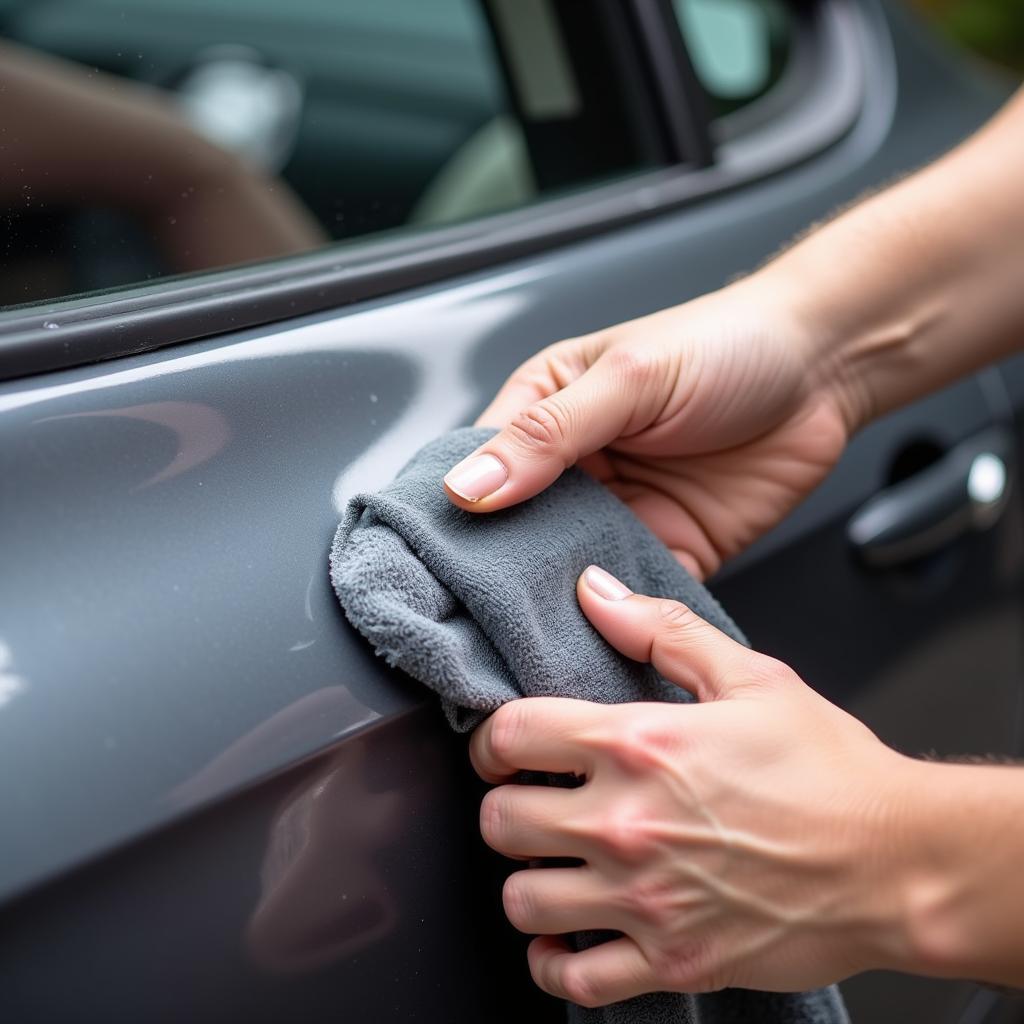Fixing a British classic car can be a labour of love, a source of immense satisfaction, or a frustrating endeavour. This guide provides expert advice and practical tips to help you navigate the challenges and joys of maintaining and repairing these iconic vehicles. Whether you’re a seasoned mechanic or a passionate owner, understanding the nuances of these classic cars is crucial for a successful restoration or repair.
Understanding the Unique Challenges of British Classic Cars
British classic cars are renowned for their character, style, and driving experience. However, they also present unique challenges compared to modern vehicles. These often stem from older technology, different manufacturing standards, and the availability of parts.
Electrical Systems: The Prince of Darkness
Lucas electrics, often jokingly referred to as the “Prince of Darkness,” are a common source of frustration for classic car owners. Understanding the quirks of these systems is essential. Problems can range from intermittent faults to complete failures.
- Check all connections for corrosion or looseness.
- Test the battery and charging system.
- Inspect the wiring harness for damage.
 Troubleshooting Lucas Electrical Systems in British Classic Cars
Troubleshooting Lucas Electrical Systems in British Classic Cars
Rust: The Persistent Enemy
Rust is a common enemy of classic cars, especially British ones. The damp climate and use of different metals can accelerate corrosion. Regular inspections and preventative measures are key to combating rust.
- Thoroughly inspect the undercarriage, wheel arches, and sills.
- Treat any rust spots promptly to prevent further spread.
- Consider using rustproofing products.
Parts Availability: The Hunt for Treasure
Sourcing parts for a classic British car can be an adventure in itself. While some parts are readily available, others can be scarce or expensive. Knowing where to look and who to contact is vital.
- Join online forums and communities dedicated to your specific car model.
- Contact specialist suppliers and dismantlers.
- Consider reconditioning existing parts where possible.
Fix British Classic Car: Common Issues and Solutions
Why Won’t My Classic Car Start?
This is perhaps the most common question. Several factors can contribute to starting problems, from a dead battery to a faulty ignition system.
- Check the battery voltage.
- Inspect the ignition coil and distributor.
- Verify fuel delivery.
How Do I Fix Overheating?
Overheating can be caused by a variety of issues, including a faulty thermostat, low coolant levels, or a blocked radiator.
- Check the coolant level and top it up if necessary.
- Test the thermostat and replace it if faulty.
- Flush the radiator and cooling system.
“Regular maintenance is the key to keeping your British classic car on the road. A little preventative care can save you a lot of headaches down the line.” – Arthur Davies, Classic Car Specialist
Addressing Oil Leaks
Oil leaks are a common occurrence in older cars. Identifying the source of the leak is crucial for effective repair.
- Clean the engine to pinpoint the leak’s origin.
- Check gaskets and seals for wear and tear.
- Tighten or replace any loose or damaged components.
“Don’t be afraid to get your hands dirty. Working on your classic car can be a rewarding experience, and you’ll learn a lot about your vehicle in the process.” – Eleanor Vance, Automotive Engineer
Conclusion: Keeping Your British Classic on the Road
Fixing a British classic car requires patience, knowledge, and a passion for these timeless machines. By understanding the common challenges and following the advice in this guide, you can keep your classic car running smoothly for years to come. Remember, regular maintenance is key to preventing major problems and preserving the value of your cherished vehicle. For personalized assistance and expert advice, connect with us at AutoTipPro. Call us at +1 (641) 206-8880 or visit our office at 500 N St Mary’s St, San Antonio, TX 78205, United States.
FAQ
- What are the most common electrical problems in British classic cars? Issues with the Lucas electrical system, including faulty wiring, switches, and components, are common.
- How can I prevent rust on my classic car? Regular cleaning, undercoating, and storing the car in a dry environment can help prevent rust.
- Where can I find parts for my classic British car? Specialist suppliers, online forums, and car clubs are good resources for finding parts.
- What should I do if my classic car overheats? Check the coolant level, thermostat, and radiator for potential problems.
- How can I identify the source of an oil leak? Clean the engine and look for fresh oil to pinpoint the leak’s location.
- What are some good resources for learning more about fixing British classic cars? Online forums, workshops, and classic car clubs are excellent resources.
- Is it difficult to fix a British classic car myself? With some mechanical knowledge and patience, many repairs can be done DIY. However, some tasks may require professional assistance.





Leave a Reply